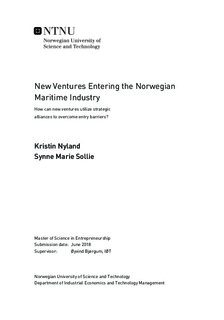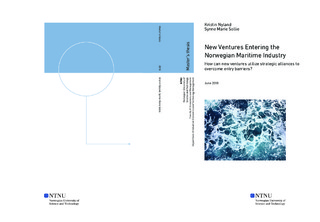| dc.description.abstract | This master thesis explores how Norwegian new ventures can overcome entry barriers in the Norwegian maritime industry (NMI), and how they can build legitimacy and survive through various forms of strategic partnerships. More specifically the study investigates entry barriers in the NMI, motives for forming alliances, partner selection criteria, partner contributions, and strategies for how new ventures build legitimacy in the NMI.
Several new ventures have attempted to enter the Norwegian maritime industry, but most of them do not succeed. The NMI is a typical mature industry, and it is therefore characterized, among other things, to be driven by large capital, with laws and regulations that may be demanding, and have culture and norms within the industry that can be challenging for new players. This is especially true for small players such as new ventures who often have limited resources and networks. This is also the reason why this assignment focuses on strategic partnerships as a tool for how new firms can build legitimacy to overcome entry barriers in the NMI.
A literature study has been conducted to gain better insight into how existing literature discusses issues related to the challenges of entering the NMI. According to some lack of literature in this area, the emphasis has been placed on mapping specific entry barriers for new firms in this industry. Based on this literature study and the empirical data from interviews from four different new ventures that are now operating in the NMI, we look at the use of strategic partnerships and how they are attempting to build legitimacy as two main pillars for how a new firm can achieve a successful entry in the industry.
The findings indicate that the choice of strategic partnerships varies for different types of new ventures. If the firm delivers a complex technology, they need partners that can assist with network, capital, legitimacy and as a guarantee for delivery, but if the firms delivers a "support service" technology, they need (at the very least) partners who can assist with legitimacy. The different case firms that have been interviewed have similarities as they all provide technology that be categorized within green technology, but they are also different in age, experience, network, products and entry strategies.
The findings in this master thesis concludes that strategic partnerships are critical for new ventures to overcome entry barriers in a mature industry. Furthermore, we emphasize that founders' personal relationships and industry backgrounds are crucial for providing the necessary legitimacy to attract these partners. Furthermore, it also appears that legitimacy is critical to acquire necessary resources, capital and customers, in order to grow and survive. Without relevant industry background and network, new ventures will not have the necessary legitimacy to enter a mature industry, such as the NMI. | |

